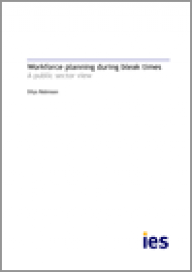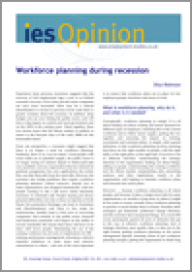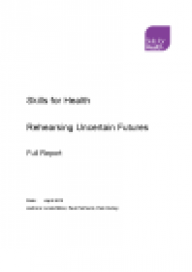Publications
 We author and publish a range of resources to keep you up to date with the latest developments in employment, labour market and human resource policy and practice.
We author and publish a range of resources to keep you up to date with the latest developments in employment, labour market and human resource policy and practice.
All our pdf publications are free to access.
Search results
-

IES Annual Review 2010
Sep 2010 | Institute for Employment StudiesIES Annual Review 2010
-

Workforce planning during bleak times
A public sector view
Robinson D | Sep 2010 | Institute for Employment StudiesDeep budget cuts were hitting the public sector in 2010, and would have a big impact on central and local government and on the NHS in the following years. The challenge for the public sector over the short and medium term was to plan workforce reductions to get not only the best possible outcome for service delivery, but also a sustainable workforce to carry the organisation into the future.
-

Workforce planning during recession
Robinson D | Sep 2010 | Institute for Employment StudiesExperience from previous recessions suggests that the recovery of full employment lags a year or so behind economic recovery. Even when private sector companies are once more successful, there may be a natural disinclination to recruit to previous levels until there is greater certainty about the economy. In 2010, deep budget cuts were hitting the public sector, and would have a big impact on central and local government and on the NHS in the following years. Taken together, these factors meant that the labour market was unlikely to return to the buoyant days of the early 2000s for the foreseeable future.
-

Uncertain Futures: Scenario Building for Skills for Health
Miller L, Fairhurst P, Hurley P | Sep 2010 | Skills for HealthThe aim of this project was to help explore what the possible futures might look like, how the sector might respond to the challenges presented by these scenarios and, potentially, how the sector, and Skills for Health in particular, could influence the emerging future and plan effectively for future skills requirements. Activities undertaken included a series of interviews with sector experts; analysis of commentaries commissioned by Skills for Health; skills and labour market intelligence; three scenario-building workshops attended by health sector representatives; development of three scenarios; and an application workshop with colleagues in Skills for Health.
-
📄
Top Employers for Working Families - Benchmarking Report 2010
Mercer M, Jackson S | Sep 2010 | Institute for Employment Studies, and Working FamiliesIn terms of engagement and motivation, the evidence shows that well-managed flexibility elicits higher performance and the potential business benefits of flexible working on productivity, financial performance, quality, employee attraction, retention, commitment and reduced absence are well documented. This benchmark aims to provide data and a crucial insight into what is currently working in practice, what needs to work, and the direction of future organisational focus.
-
📄
Learning from the downturn - Key messages from an employer perspective
Chubb C, Reilly P, Usher T | Aug 2010 | Institute for Employment StudiesThis research report, produced for the IES HR Network, looks at the initiatives that HR functions took to reduce redundancy and protect skills during the recent recession. The aim of the research was to see whether organisations were responding to economic problems differently than in the past, and, if so, why there were adopting these strategies; and to consider whether such initiatives might have longer term beneficial impacts.
-
📄
Women in Leadership: Time to Intervene?
Robinson D, Hicks B | Aug 2010 | Institute for Employment StudiesSeveral organisations that realise the importance of a diverse senior team, and are attempting to address inequality at this level, have asked IES to investigate what is going on: what are the barriers stopping women from getting to the top, are HR systems and processes inadvertently discriminatory, and what actions should organisations take? Although the majority of this client work has explored the career paths of women and the obstacles and enablers they have encountered, many of the findings can be applied across all under-represented employee groups.
-
📄
27 National Seminars on Anticipating and Managing Restructuring - A.R.E.N.A.S.
Bergström O, Broughton A, Triomphe C E | Aug 2010 | European CommissionThis report examines the measures used for anticipating and managing restructuring in the 27 Member States of the European Union at the end of the first decade of the 21st Century. Restructuring is defined here as any change in the structure of an organisation with an impact on the employment or working conditions of the workers.
-
📄
European Restructuring Monitor Quarterly - 2010, Issue 2
Hurley J, Riso S, Salvatore L, Billingham D, Broughton A | Aug 2010 | European Monitoring Centre on ChangeEurope continued to show signs of a tentative recovery with marginally positive growth and other economic indicators stabilising. There were however persistent concerns over levels of public debt and, to a lesser extent, over the stability of the euro. Unemployment had not risen in the last quarter (9.6%, EU27 in each of the three months February to May 2010) having increased sharply (by 3 percentage points) since the beginning of 2008.
-
📄
Flexible Nursing
Report for NHS Professionals
Mercer M, Buchan J, Chubb C | Jul 2010 | NHS ProfessionalsThis literature review focuses on flexible resourcing of nursing staff in the National Health Service (NHS) through the three main types of temporary nursing staff; bank nurses, agency nurses and nurses provided through NHS Professionals. It also examines flexible working arrangements for permanent nurses within the NHS.
